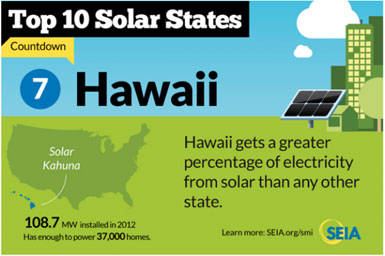Hawaii Electric announced that 21% of its electricity comes from renewables, far exceeding the state’s Renewable Portfolio Standard (RPS) that targets 15% by 2015.
12% of residential customers have on-site solar – a penetration level that leads the nation, says the utility. Partially that’s because Hawaii has very high energy prices because it imports all its oil, but it is also because the utility has been proactive on developing home-grown energy.
The utility filed a Power Supply Improvement Plan with the Hawaii Public Utilities Commission which would:
- Increase renewable energy to over 65% by 2030
- Triple the amount of distributed solar by 2030
- Lower electric bills 20% by 2030
In other words, a utility is actually promoting the idea of raising the state’s RPS, instead of trying to crush it like we’re seeing in too many states.

In 2014, "we continued to grow our businesses in steady fashion and delivered a competitive core return on equity of 9.8% for the year as Hawaii Electric’s combination of companies continues to provide us with the financial resources to efficiently invest in future opportunities," says Constance Lau, CEO.
Part of that investment is in grid modernization to be able to integrate more renewable energy. A clear, open planning process will let customers and solar contractors know how much more solar can be added each year, says Hawaii Electric.
"Even as recent oil price decreases have brought our customers bill relief, we remain focused on further reducing costs for our customers with proposed grid-scale solar and wind projects," Lau said. "We also are working with other stakeholders to bring liquefied natural gas to Hawaii as a cleaner, lower-cost alternative to oil while we continue to aggressively pursue more renewable generation sources."
Hawaii Electric is being acquired by NextEra Energy, one of the largest renewable energy developers, currently repowering parts of Altamont Pass Wind Farm and part-owners of the recently completed 550 MW Desert Sunlight Solar Project, for example. NextEra’s utility side, Florida Power & Light, isn’t very forward looking.
Read our article, Hawaii Plans For Solar, Instead of Reacting To It.
